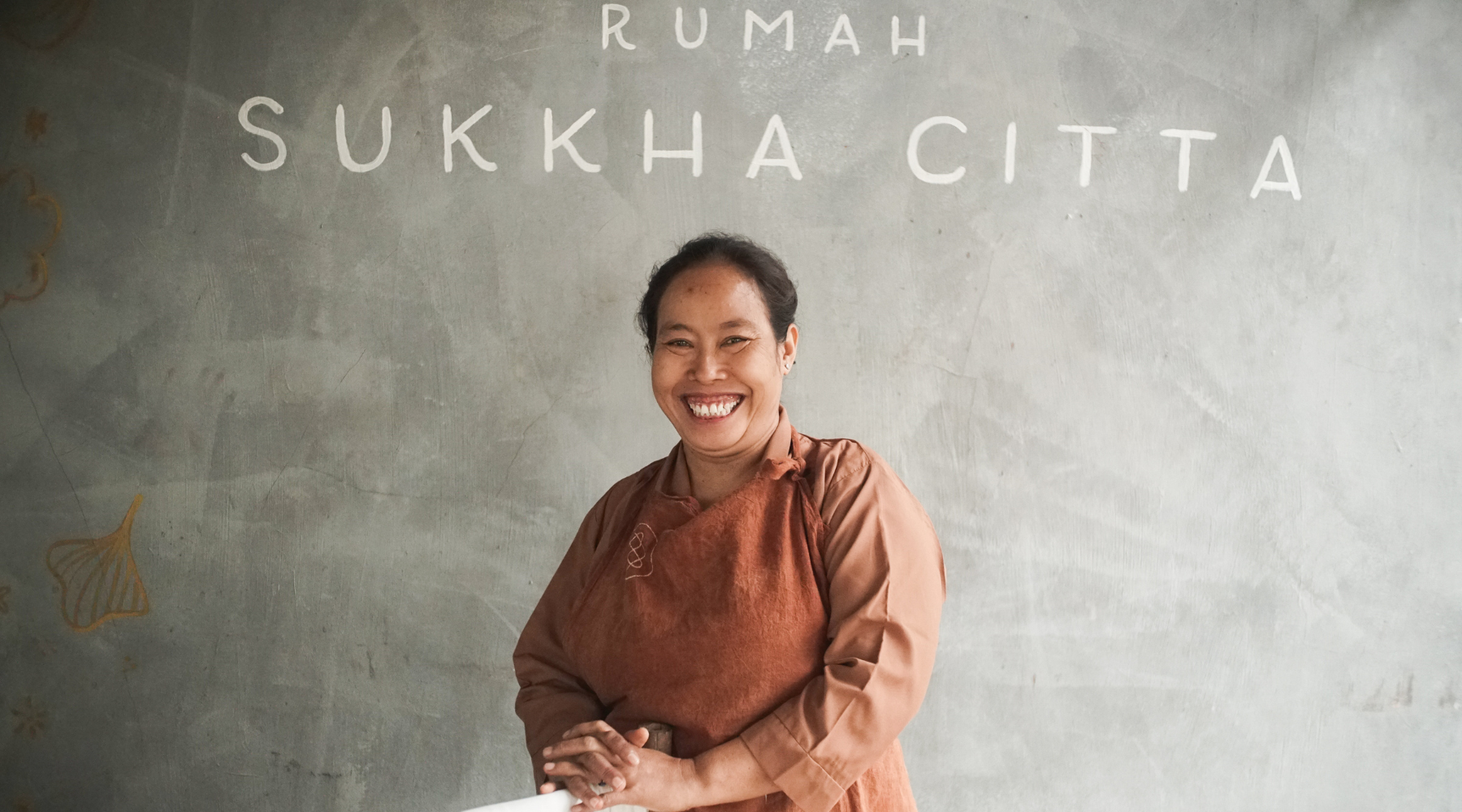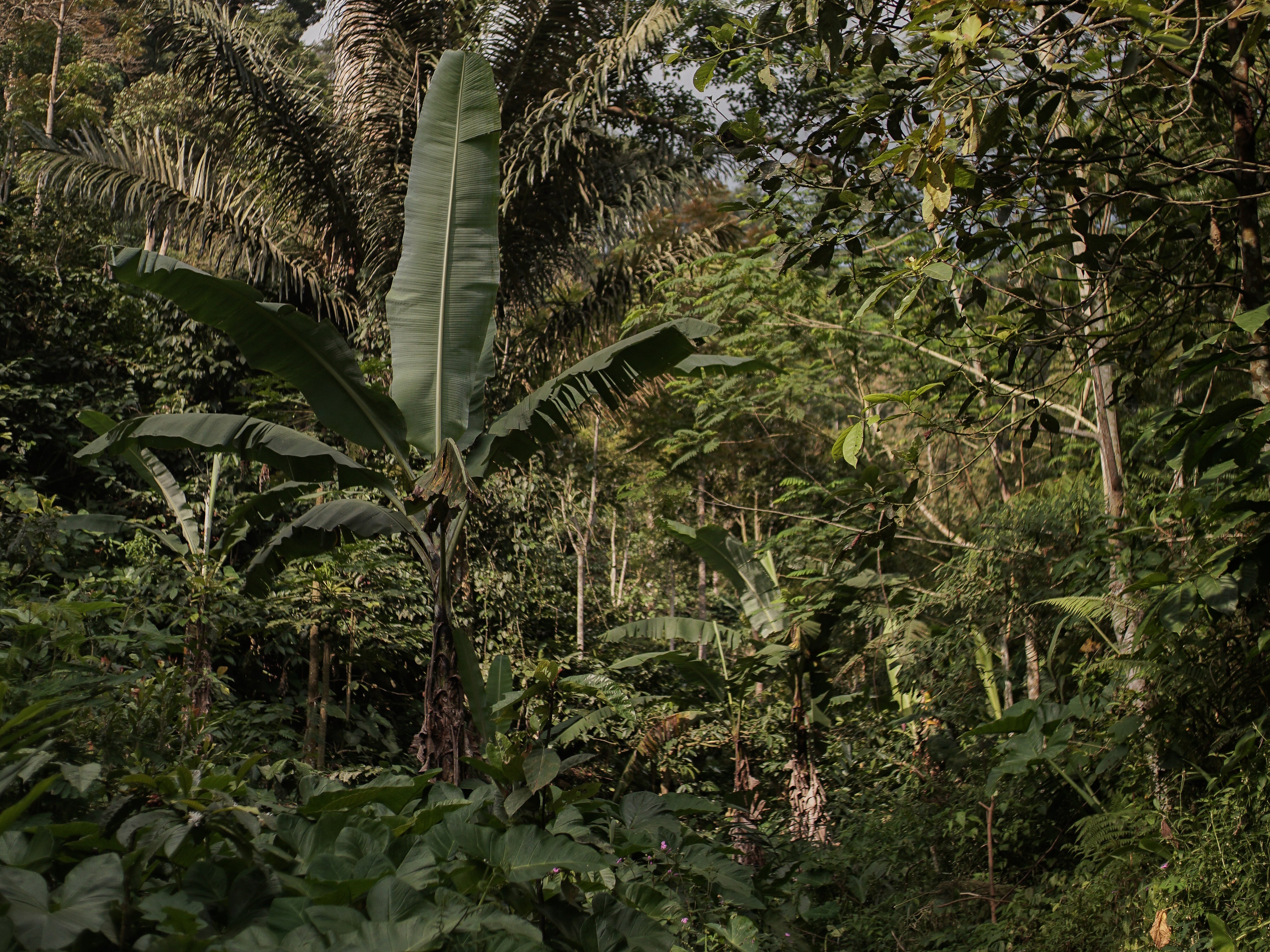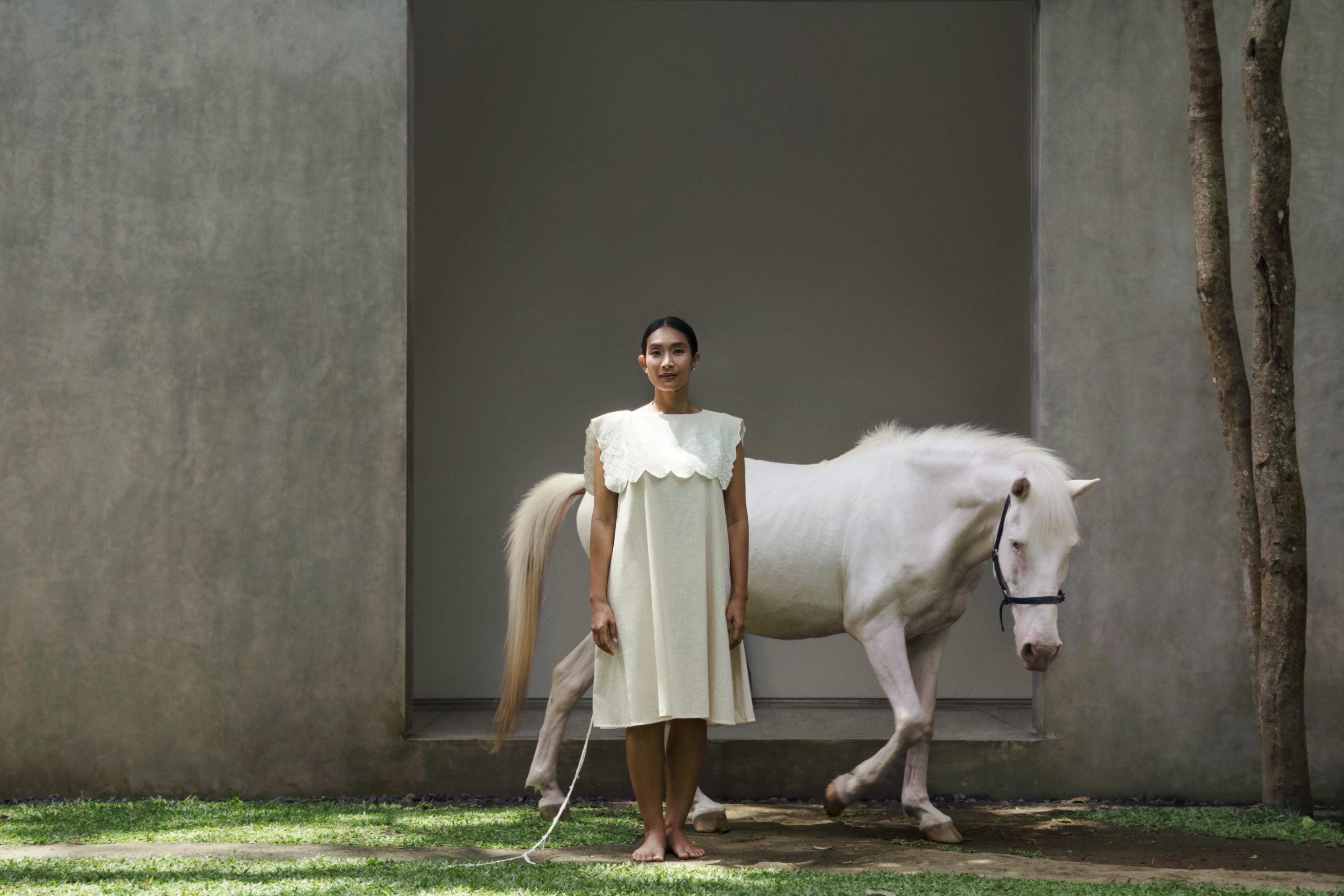
Meet the women who make your clothes so meaningful! Through education and access to a living wage, your #MadeRight clothes are changing lives in villages across Indonesia. In this interview, I speak to Ibu Moen, one of the artisans who craft your Seribu Bunga pieces. She shares her experience going through our Ethically Handcrafted certification from NEST.
_
Denica (D): Hi Ibu Moen! How are you? What are you busy with now?
Ibu Moen (IM): Alhamdulillah, I am good and healthy. Everyday, I am busy with my Batik fabric in Rumah SukkhaCitta while taking care of my grandchildren.
Alhamdullilah Mbak Den, kabar saya Baik. Dan saat ini saya masih sibuk membatik di Rumah SukkhaCitta, sambil bantu-bantu menjaga cucu-cucu saya.
D: You went through months of trainings as part of our Ethically Handcrafted certification. From calculating how much you should get for a fabric, anti-discriminatory practices, all the way to natural dyeing with natural processes. What has this experience taught you?
IM: I feel excited with all the new knowledge. It was such an insightful experience, learning on steps to ensure our safety at work, my rights as a craftswoman, and how much my work is worth.
I feel valued. Especially because I thought my occupation as a Batik artisan is a lowly one. But I see things differently now. I know I deserve to get the same rights like anyone else.
Saya merasa senang sekali. Saya bersemangat mendapatkan banyak ilmu baru, pengetahuan baru mengenai apa yang perlu kita lakukan ketika ada kecelakaan kecil di tempat kerja, hak-hak yang kita dapatkan, dan upah yang adil.
Saya merasa sangat dihargai. Apalagi karena pada awalnya saya kira menjadi pembatik sering kali dianggap sebagai pekerjaan buruh. Sekarang saya memiliki tanggapan yang berbeda. Saya tahu betul bahwa saya berhak mendapatkan hak-hak yang pantas diperoleh oleh pekerja lainnya.
 D: We covered a lot of topics in this certification process, from child labor, to health and safety in Rumah SukkhaCitta, to environmental impact of production. According to Ibu Moen, which is the most important?
D: We covered a lot of topics in this certification process, from child labor, to health and safety in Rumah SukkhaCitta, to environmental impact of production. According to Ibu Moen, which is the most important?
IM: For me, the most important thing is the economic impact me and my family experienced. It's still fresh in my memory. How when the pandemic started, we lost our jobs. My husband couldn't work because everything was closed. He didn't have any other income for two years.
But I consider myself one of the lucky ones. Because we still received work from SukkhaCitta. We all felt supported. So, at least I could still take care of my family. None of my children even had to stop school because of it.
And it's not just me. All the Ibus here felt it. SukkhaCitta gave us hope to keep going. I wouldn't know what would have happened to me and my family otherwise.
Yang paling penting bagi saya adalah dampak ekonomi terhadap keluarga. Saya ingat betul ketika pandemi masih ada, banyak anggota keluarga saya kehilangan pekerjaan. Contohnya, suami saya tidak bisa bekerja karena tempat wisata ditutup, sehingga ia tidak memiliki pendapatan sama sekali selama dua tahun.
Namun, saya masih beruntung karena masih ada pekerjaan dari SukkhaCitta. Kami merasa dibantu oleh itu. Dan karena itu, saya masih bisa melanjutkan hidup dan juga menyekolahkan anak saya.
Begitu juga dengan apa yang dirasakan oleh ibu-ibu pembatik lainnya. SukkhaCitta adalah harapan hidup kami. Entah bagaimana nasib saya dan keluarga jika tidak ada pekerjaan ini.
 D: What does “Ethically Handcrafted” mean to you?
D: What does “Ethically Handcrafted” mean to you?
To me, it means that it's made in the right way. Right process. Right wages. No violence or abuse whatsoever, as well as a safe and comfortable working condition.
Arti dari kata tersebut menurut saya bisa dimaknakan sebagai produk yang dibuat dengan Etis melalui cara yang Benar, dan juga proses yang Benar. Benar cara memberi upahnya. Tidak ada kekerasan dalam bekerja, lingkungan kerja, dan selainnya. Bekerja dengan aman di tempat yang nyaman.
D: During this year's Recertification process, you were interviewed by the inspector from Nest without us present. What did you feel?
In the beginning, I was nervous and afraid. Afraid I wouldn't be able to answer the question, but apparently I can! So, my fear disappeared and I felt comfortable as there was a translator too.
It made me feel even more confident and seen as a human. All this time, everyone told me to be an artisan is a low laborer's work. But others see it differently, they see our work as valuable, and now I am filled with gratitude and pride for what we are doing here.
Awalnya saya merasa gugup dan takut. Takut karena tidak bisa menjawab, tetapi ternyata pertanyaannya dapat saya tangani! Sehingga rasa ketakutan diawal hilang, dan pada akhirnya saya merasa santai dan nyaman karena ada yang bisa menerjemahkan pertanyaan-pertanyaannya dalam Bahasa Indonesia.
Saya lebih merasa percaya diri lagi, lebih berharga dan lebih dimanusiakan. Selama ini orang-orang berkata bahwa membatik adalah pekerjaan rendahan. Tetapi ternyata ada juga orang-orang lainnya yang mengganggap membatik sebagai pekerjaan yang luar biasa, sehingga saya bisa merasa terharu dan bangga atas apa yang saya lakukan sekarang.
 D: You were one of the very first Ibus who joined our program here. Can you share what it's been like?
D: You were one of the very first Ibus who joined our program here. Can you share what it's been like?
Me and my family feel so supported. Years ago, I quit being a Batik artisan because I just couldn't earn enough. Ever since, I was selling drinks in a stall nearby.
One day, I was invited by Ibu Kustini to join a natural dye training. In the beginning, I wasn't sure, because before there were so many programs but no result. But I made the decision to join, and until now it's been almost seven years it's running. SukkhaCitta is still here together with us, helping us.
We went through so many ups and downs. In the beginning, we started from zero. Almost all fabrics we dyed with natural dye failed. From it being uneven, or the color wouldn't stick, and so many other problems! But SukkhaCitta kept standing by our side, and that gave us strength to keep trying. Until now, look at the colors we can make! [Laughs while pointing at our latest SappanPink release]
Saya dan keluarga saya merasa sangat terbantu. Dulu, saya sempat berhenti membatik karena tidak bisa menghidupkan keluarga saya dengan pekerjaan tersebut, sehingga akhirnya saya memilih untuk berjualan di warung tempat wisata saja.
Kemudian saya diajak mengikuti pelatihan pewarnaan alam oleh Ibu Kustini. Awalnya saya memang tidak yakin karena sudah sering mengikuti, namun tidak ada hasilnya. Saya memutuskan untuk tetap ikut dan ternyata program SukkhaCitta sampai detik ini pun masih berjalan dan sudah tujuh tahun membantu kami.
Saya mengalami banyak kejadian baik dan buruk. Kami mulai dari tidak memiliki pengetahuan mengenai pewarnaan alam sama sekali. Hampir setiap pewarnaan kami gagal. Terkadang hasil dari pewarnaan alami tidak rata, atau luntur, dan banyak sekali masalah yang kami lewati. Tetapi SukkhaCitta terus menyemangati dan terus memberi kesempatan untuk kami. Itulah alasan kenapa kami tidak pernah menyerah, dan terus mencoba. Terus memperbaiki kualitas Batik kami. Sekarang lihatlah warna-warna yang bisa kami hasilkan!

D: Last year, your daughter joined our apprentice program in Rumah SukkhaCitta. How does that make you feel?
I am happy and also proud that my daughter wants to continue our tradition. By now, I feel that her fabrics are more beautiful than mine, hehe.
Saya senang dan juga bangga bahwa anak saya mau melanjutkan tradisi kami. Bahkan, hasil batiknya bisa lebih cantik dari batik saya, hehe.
D: What would you like to say to those who wear your fabrics?
The piece you purchased means hope to us.
Baju yang Anda beli memberikan harapan kepada kami.
_
The interview ended with a hug and a snack.




